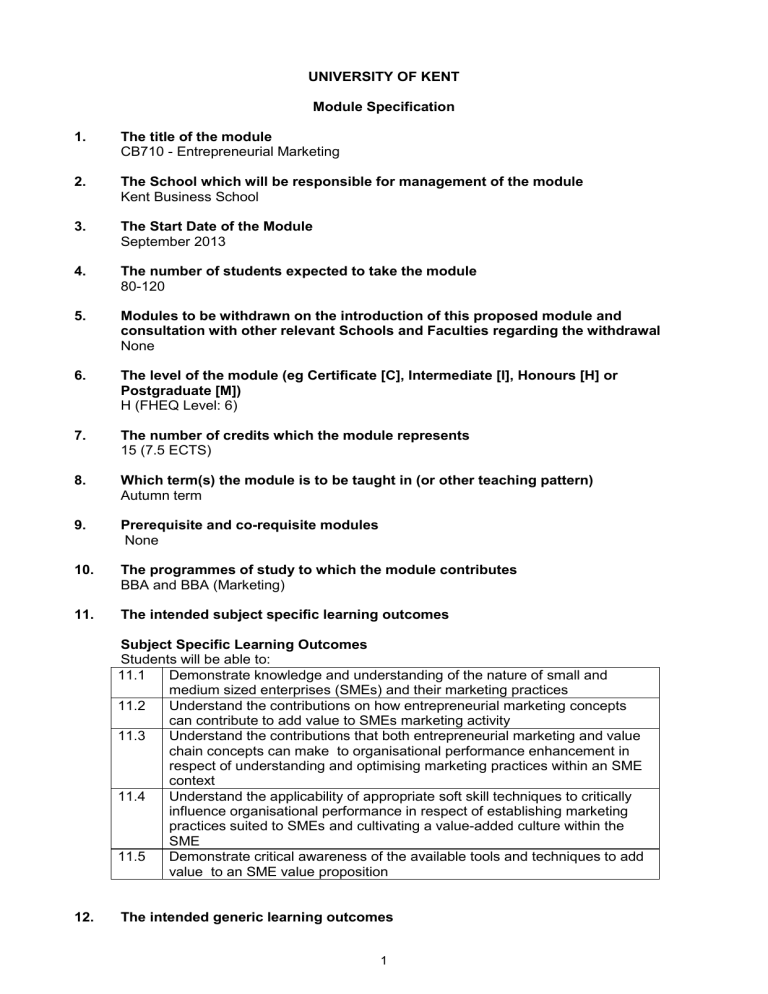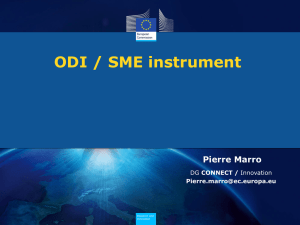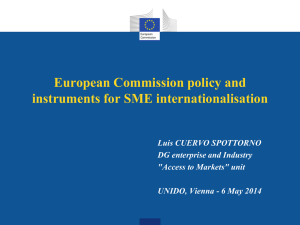University of Kent at Canterbury

UNIVERSITY OF KENT
Module Specification
1. The title of the module
CB710 - Entrepreneurial Marketing
2. The School which will be responsible for management of the module
Kent Business School
3. The Start Date of the Module
September 2013
4. The number of students expected to take the module
80-120
5. Modules to be withdrawn on the introduction of this proposed module and consultation with other relevant Schools and Faculties regarding the withdrawal
None
6. The level of the module (eg Certificate [C], Intermediate [I], Honours [H] or
Postgraduate [M])
H (FHEQ Level: 6)
7. The number of credits which the module represents
15 (7.5 ECTS)
8. Which term(s) the module is to be taught in (or other teaching pattern)
Autumn term
9. Prerequisite and co-requisite modules
None
10. The programmes of study to which the module contributes
BBA and BBA (Marketing)
11. The intended subject specific learning outcomes
Subject Specific Learning Outcomes
Students will be able to:
11.1 Demonstrate knowledge and understanding of the nature of small and medium sized enterprises (SMEs) and their marketing practices
11.2 Understand the contributions on how entrepreneurial marketing concepts can contribute to add value to SMEs marketing activity
11.3 Understand the contributions that both entrepreneurial marketing and value chain concepts can make to organisational performance enhancement in respect of understanding and optimising marketing practices within an SME context
11.4 Understand the applicability of appropriate soft skill techniques to critically influence organisational performance in respect of establishing marketing practices suited to SMEs and cultivating a value-added culture within the
SME
11.5 Demonstrate critical awareness of the available tools and techniques to add value to an SME value proposition
12. The intended generic learning outcomes
1
Generic Learning Outcomes
Students will be able to:
12.1 Self-manage their learning
12.2 work with others efficiently and effectively
12.3 work in interdisciplinary areas relating theories from different subjects
12.4 address problems in a logical and structure way
12.5 communicate effectively through oral communications and written documents
13. A synopsis of the curriculum
Introduction to Entrepreneurial Marketing
The nature of the small and medium sized business
The skill of taking the right decision when available resources are limited
Learning how to identify marketing opportunities within an SME context
The role of structured marketing information in SME decision making
Value propositions: how to build SMEs offer, based on Ries and Trout’s positioning theory
Pricing and Distribution decisions: how to set competition based prices and manage distribution strategies within low distribution capacity environments
Building strong brands in strong SMEs
The importance of supply chain relationships management with the SME stakeholders
Growth strategies within an SME context
Note on module distinctiveness: SMEs are characterised by constraints in their resources.
These constraints hamper SMEs marketing activity, which is often described being haphazard. This module will teach students some main challenges SMEs face in their relationship with marketing as a concept and with marketing management in practice. The principles of marketing learnt in CB680 Introduction to Marketing and CB683 Marketing
Strategy, will be revisited within an SME context.
14. Indicative Reading List
Reading will be taken from a set of specified articles to be published in the module guide.
These will be a mixture of sources from academic to industry publications. Such reading will provide the intellectual platform for the module beyond the lecture series.
Text book:
Crane (2010), Marketing for Entrepreneurs, Sage
(Paperback ISBN 9781412953474, Hardcover ISBN 9781412953467)
Further Recommended Books
Lodish, Morgan, Archambeau (2007), Marketing that works: how entrepreneurial marketing can add sustainable value to any sized company, 1 st Edition, Wharton School Publishing
(ISBN-10: 0132390752, ISBN-13: 978-0132390750)
Lodish, Morgan, Kallianpur (2001), Entrepreneurial Marketing: Lessons from Whartons’
Pioneering MBA course, 1 st Edition, Wiley
(ISBN-10: 0471382442, ISBN-13: 978-0471382447)
Scientific Journals:
- Entrepreneurship: Theory and Practice
- Entrepreneurship and Regional Development
- International Small Business Journal
- Journal of Small Business Management
- Journal of Marketing Management
- Journal of Research in Entrepreneurship and Marketing
- British Food Journal
2
It is likely that short video clips will also be made available via the dedicated module web site, as well as articles from industry publications. These will be the basis of short seminar case discussions
15. Learning and Teaching Methods, including the nature and number of contact hours and the total study hours which will be expected of students, and how these relate to achievement of the intended learning outcomes
Overall Study Hours
Term 1
Lectures
Seminars
11
10
Independent study
Total
129
150
In this module teaching is designed to be as innovative as possible, with the inclusion where appropriate of multimedia or computer based material. The module is simulation based and the simulation can take place either on hardware material or software, should a computer based programmed be developed in the future. Also, the module deliverance includes the use of current technology: twitter, webinars, online tutorials, videos and podcasts available for PCs, tablets and mobile phones. Note: the deliverance of the module might include consecutive teaching hours to conduct group work activities after being prompted by theoretical considerations delivered in a lecturing style.
Subject- Specific Learning Outcomes
Subject-
Specific
Learning
Outcome
Learning and Teaching Methods
11.1
11.2
11.3
11.4
11.5
Individual/group coursework
Lectures or podcasts
Seminars or
Webinars
Generic Learning Outcomes
Generic Learning and Teaching Methods
Learning
Outcomes
12.1
12.2
12.3
12.4
12.5
Individual/group coursework
Lectures or podcasts
Seminars or
Webinars
16. Assessment methods and how these relate to testing achievement of the intended learning outcomes
3
Assessment Strategy
Task Description Weighting
Online/Paper Mini Quiz 1 15 %
Online/Paper Mini Quiz 2 15 %
Online/Paper Mini Quiz 3 15 %
Coursework 55 %
Date Task Set
Week 5
Week 7
Week 9
Start of term
Submission Date
Week 5
Week 7
Week 9
End of Term
Assessment will be by examination and coursework. The examination will consist in three mini quizzes delivered either online or in paper (potential employment of optical reading technologies already used by the University of Kent to assess modules preferences or new technologies, e.g. Moodle, Qualtrics, and so on, to be checked with IT manager). Each quiz will have a 15% weight on the overall mark. The coursework will consist in either a written marketing plan for an SME, shaped on the experience of the SME marketing decisions simulation that takes part during the 10 weeks of seminar or a written discussion of an entrepreneurial marketing case study that may substitute the simulation. The coursework length should range between 2000 and 4000 words excluding appendices, references, tables and figures. This should mirror the reports written by consultants.
Subject- Specific Learning Assessment Strategy
Outcome
11.1
11.2
11.3
11.4
11.5
Individual/group coursework Online paper/mini quiz
Generic Learning Outcomes
Generic Learning
Outcomes
12.1
12.2
12.3
12.4
12.5
Assessment Strategy
Individual/group coursework Online paper/mini quiz
17. Implications for learning resources, including staff, library, IT and space
Lecture theatre, seminar rooms and potential use of IT lab as well as the introduction of notebooks ad-hoc networks or mobile devices.
18. The School recognises and has embedded the expectations of current disability equality legislation, and supports students with a declared disability or special educational need in its teaching. Within this module we will make reasonable adjustments wherever necessary, including additional or substitute materials, teaching modes or assessment methods for students who have declared and discussed their learning support needs. Arrangements for students with declared disabilities will be made on an individual basis, in consultation with the University’s disability/dyslexia support service, and specialist support will be provided where needed
19. Campus(es) where module will be delivered:
Canterbury
4
Statement by the Director of Learning and Teaching: "I confirm I have been consulted on the above module proposal and have given advice on the correct procedures and required content of module proposals"
................................................................
Director of Learning and Teaching
…………………………………………………
Print Name
..............................................
Date
Statement by the Head of School: "I confirm that the School has approved the introduction of the module and, where the module is proposed by School staff, will be responsible for its resourcing"
.................................................................
Head of School
…………………………………………………….
..............................................
Date
Print Name
Last updated
January 2013
5








